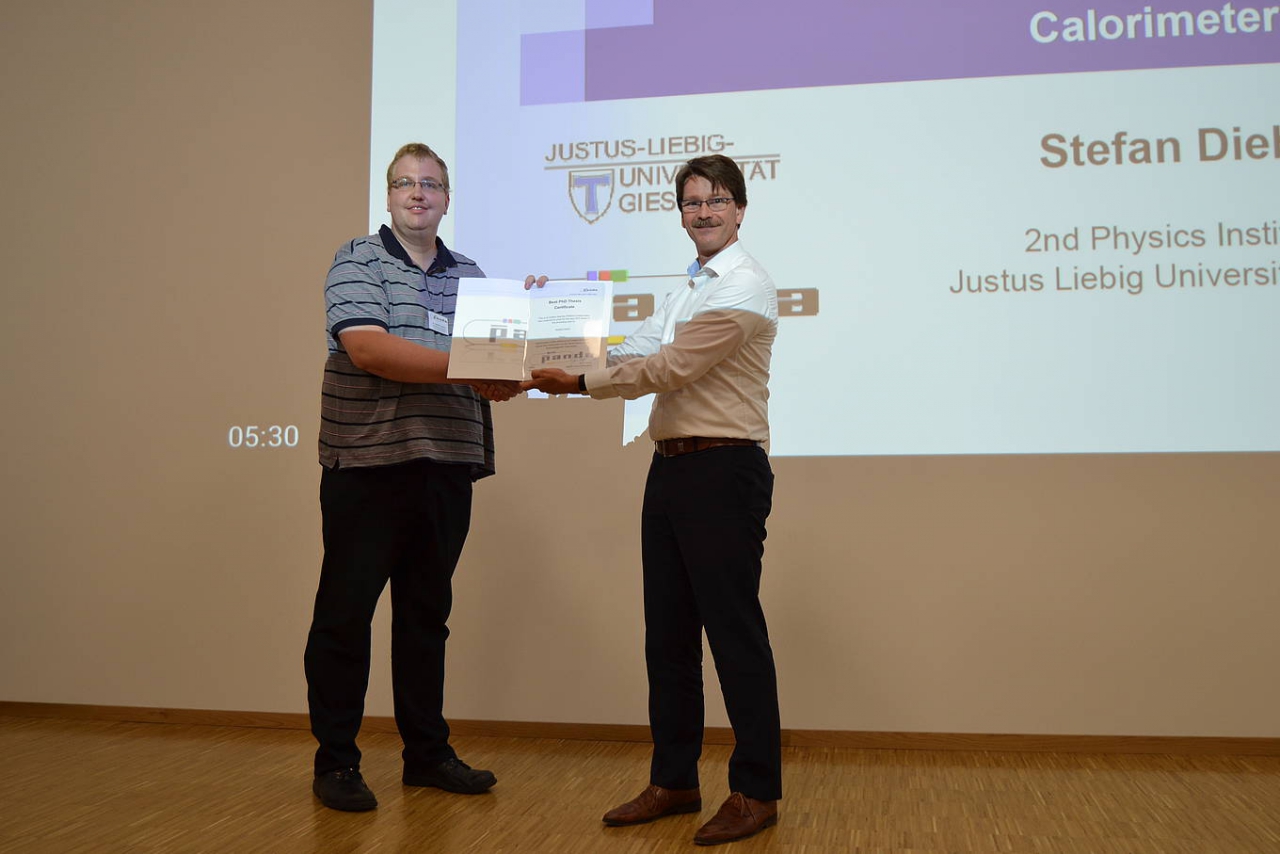Sie sehen momentan nur den öffentlichen Teil des GSI-Kuriers.
Um auch die GSI-internen Artikel angezeigt zu bekommen,
melden sie sich bitte an

Kurier - Mitteilungen von und für Mitarbeitende
Ausgabe: 42-2016 | 17.10. - 23.10.
Nachrichten
Nachrichten
Panda-Kollaboration zeichnet Doktoranden aus: PhD-Preis für Dr. Stefan Diehl

Quelle: Udo Kurilla
Der Sprecher der Panda-Kollaboration, James Ritman vom Forschungszentrum Jülich, übergab die Auszeichnung beim jüngsten Panda-Kollaborationstreffen am Helmholtz-Institut Mainz an Dr. Stefan Diehl (links).
James Rittman from Forschungszentrum Jülich, spokesman of the Panda Collaboration, presented the award to Dr. Stefan Diehl (left) at the most recent Panda Collaboration meeting at the Helmholtz Institute in Mainz.
Dr. Stefan Diehl hat für seine Promotionsarbeit bei GSI und FAIR sowie an der Justus-Liebig-Universität Gießen den Panda PhD-Preis 2016 erhalten. Übergeben wurde die Auszeichnung beim jüngsten Panda-Kollaborationstreffen am Helmholtz-Institut Mainz durch den Sprecher der Panda-Kollaboration, James Ritman vom Forschungszentrum Jülich.
Der 28 Jahre alte Physiker Stefan Diehl hat den Preis, der mit 200 Euro Preisgeld sowie einem Zertifikat dotiert ist, für seine Dissertation zum Thema „Optimization of the Influence of Longitudinal and Lateral Non-Uniformity on the Performance of an Electromagnetic Calorimeter“ erhalten. Betreuer der Promotion waren Professor Dr. Kai-Thomas Brinkmann und Dr. Rainer Novotny von der Justus-Liebig-Universität Gießen.
Der PhD-Preis wird seit 2013 einmal jährlich von der Panda-Kollaboration für die beste Dissertation verliehen, die im Rahmen des Panda-Experiments erstellt wurde. Panda ist eines der Schlüsselexperimente am künftigen Beschleunigerzentrum FAIR, im Mittelpunkt stehen die Forschung mit Antimaterie sowie verschiedenen Themen rund um die schwache und die starke Kraft, exotische Zustände von Materie und die Struktur von Hadronen. In der Kollaboration arbeiten mehr als 500 Wissenschaftler aus 17 Ländern zusammen. Dr. Stefan Diehl beschäftigt sich in seiner Dissertation mit dem Elektromagnetischen Kalorimeter (EMC), einem zentralen Bestandteil des Panda-Detektors, der an der FAIR-Beschleunigeranlage zur Messung von Photonen und Elektronen aufgebaut wird.
Kandidaten für den PhD-Preis werden von ihrem jeweiligen Doktorvater nominiert, Voraussetzung ist neben einem direkten Bezug zur Panda-Forschung die Bewertung der Promotion mit mindestens „sehr gut“. Bis zu drei Kandidaten kommen in die engere Auswahl und dürfen ihre Arbeit beim Panda-Kollaborationsmeeting präsentieren. Die Entscheidung erfolgt durch ein von der Panda-Kollaboration benanntes Komitee. Mit dem PhD-Preis möchte die Panda-Kollaboration die Beiträge von Studenten zum Panda-Projekt besonders würdigen.
Panda Collaboration honors PhD: Prize for Dr. Stefan Diehl
Dr. Stefan Diehl has received the Panda PhD Prize 2016 for his doctoral thesis at GSI, FAIR, and the Justus Liebig University in Giessen. The award was presented by the spokesman of the Panda Collaboration, James Rittman from Forschungszentrum Jülich, at the most recent Panda Collaboration meeting at the Helmholtz Institute in Mainz.
Physicist Stefan Diehl, 28, received the prize of €200 and a certificate for his dissertation titled Optimization of the Influence of Longitudinal and Lateral Non-Uniformity on the Performance of an Electromagnetic Calorimeter. His doctoral advisors were Professor Kai-Thomas Brinkmann and Dr. Rainer Novotny from the Justus Liebig University in Giessen.
The Panda Collaboration has awarded the PhD Prize once per year since 2013 in order to honor the best dissertation written in connection with the Panda Experiment. Panda will be one of the key experiments of the future accelerator center FAIR. The experiment focuses on antimatter research as well as on various topics related to the weak and the strong force, exotic states of matter, and the structure of hadrons. More than 500 scientists from 17 countries currently work in the Panda Collaboration. In his dissertation, Dr. Stefan Diehl studied the electromagnetic calorimeter (EMC) that forms one of the main components of the Panda detector, which is being built at the FAIR accelerator facility in order to carry out measurements of photons and electrons.
Candidates for the PhD Prize are nominated by their doctoral advisors. In addition to being directly related to the Panda Experiment, the nominees’ doctoral degrees must have received a rating of “very good” or better. Up to three candidates are shortlisted for the award and can present their dissertations at the Panda Collaboration meeting. The winner is chosen by a committee that is appointed for this task by the Panda Collaboration. The Panda Collaboration awards the PhD Prize to specifically honor students’ contributions to the Panda project.
Öffentlichkeitsarbeit
Die aktuellen internen Stellenausschreibungen finden Sie auch unter www.gsi.de/jobsintern
Gruppe PER-PAD











